Chris Phillips is tired but buoyant. He’s just got back from the local Cheesecake Factory, where he and his family have been attending a birthday celebration. For many of us, Cheesecake Factory will instantly conjure images of The Big Bang Theory, but supposedly there’s no connection: it is, I’m informed, “sort of like Ikea for food”, where every meal is laden with calories and you can feed a family of 4 for about 15 dollars, without even touching the cheesecake. “If you’re not careful you can eat about 3 or 4 days’ worth of food by accident,” he says. “That’s America for you.”
I’d love to know more, but sadly we’re not here to talk about transatlantic dietary trends, so instead I ask him about Doctor Who. Chris, together with his partner Krystal, heads up the Velocity project, a series of fan films charting the adventures of an ‘alternative’ Thirteenth Doctor, a sprightly female incarnation played by Krystal herself. We first chatted in the summer of 2018, just as the Velocity team were putting the finishing touches on their second adventure. Fast forward to the present day and a lot’s happened: Jodie Whittaker’s first series landed, to a somewhat mixed response, and Velocity has another 3 published episodes under its belt – the latest of which is really quite special. Out of the blue, Chris gets in touch to ask if we’d like to do a follow-up piece. We certainly would, which is what leads me to a Skype chat with Chris and Krystal from their home in Boise, Idaho, on a sunny Labour Day afternoon.
For the uninitiated, Velocity features a newly-regenerated Doctor cavorting through time in a cavernous TARDIS with a series of sidekicks, some of whom are more complicated than they seem at first glance. Krystal’s Doctor cut her teeth tangling with witchfinders in Essex (prognosticating a Series 11 moment months before we knew anything about it) and then swooped back to the present to fight the Daleks, not to mention their creator. Their latest adventure sees them rewind the clock 30 years to the summer of 1989, where an underground rave is about to be rudely interrupted by some rather statesque monsters.
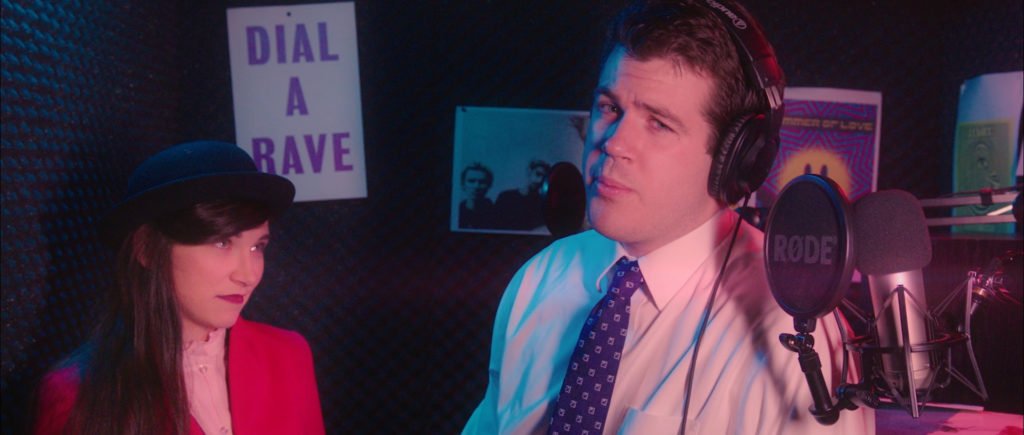
The talking point for Episode 4, of course, is that they managed to get Sophie Aldred. It’s only a cameo – 7 or 8 lines – although it’s enough to light the internet touchpaper. “Cameos are big at the moment,” says Chris, citing Marvel, “but it’s mostly fan service.” Those hoping for a glimpse of Aldred herself are liable to be disappointed: Velocity is shot on location in Idaho, and thus Ace’s appearance is limited to off-screen dialogue. But off-screen dialogue fits with the story: “I realised I’d set it in 1989, the year Doctor Who was cancelled. And I wondered… what would Ace be up to?”
Still. Giving it away in the episode description is a bit of a spoiler, surely? Isn’t that the sort of thing you want to keep secret, to maximise the impact? “We didn’t announce it until the episode came out,” says Chris. “I almost wasn’t going to reveal it, and leave it to be a complete surprise – but I also know, because of the horrible way the internet works, that we’d get far less views.” The number-crunching confirms his hunch. “Usually, with any kind of web series, you’ll see a kind of terminal decline after your first popular one. But this one – 2 years after our first – has been the strongest. That made me feel like there was a bit of longevity in it; we can keep making them.”
Chris and Krystal share writing duties for the series, but this particular story is his work, and you can tell: it’s an authentic pastiche of ’80s British culture, embedded with psychedelic backgrounds, archived news footage, and references to The Bill. Chris himself appears in a brief role as a policeman – “A couple of days’ hair growth makes me look like I’ve got quite a thick moustache, and I’m wearing a white shirt with a couple of black pieces of card stuck on my shoulders. That was a very cheap outfit.”
The Doctor may be fighting Weeping Angels, but it’s safe to say the episode is haunted by the spectre of Keith Flint – who died during its production and who lived in Chris’s home town of Braintree, Essex (“Everyone we knew as kids had a story about Keith”). Originally set at The Barn, the notorious club where the Prodigy supposedly met, the action was transferred to Stonehenge when Chris decided the location was too niche. Still, the legacy remains, not least thematically. “Back in the ’90s, [the Prodigy] got arrested under copyright laws because they stole everything. To me, that was the synergy between the fan film stuff and the music genre: we’re both stealing stuff and remixing it, so as a theme it worked quite nicely.”
The beat is still thudding round the Velocity team’s makeshift Stonehenge when the monsters turn up – and it was here that the team ran into some difficulties. “I muddled my way through making the Angels,” Chris admits. “I’m not sure I entirely succeeded. I wasn’t sure whether I wanted to see a real person or not, and with our tight turnaround and how little time I have to make it I worried about covering someone head to foot in grey. I’d seen a lot of cosplays online and I was having nightmares about filming and then having to refilm it and spending 10 hours in makeup. I thought ‘I can’t ask someone to do that’. Although I’m sure someone would…”
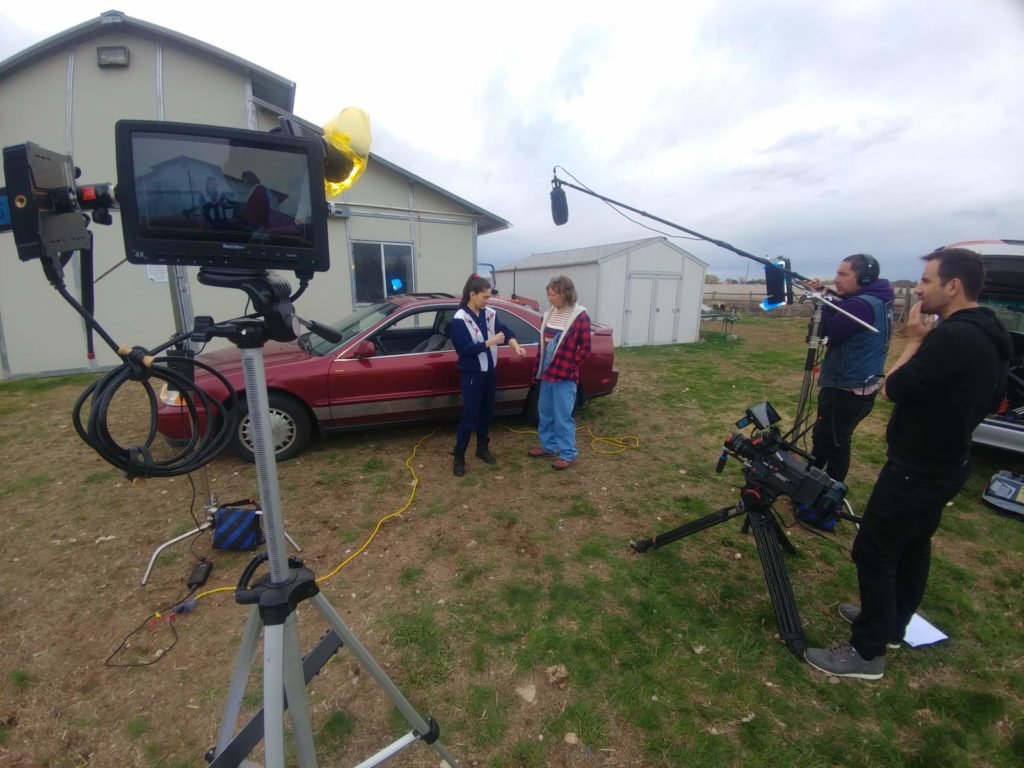
The results may look a little odd at first glance, but it fits with the theme. There’s something very ’80s about the way the Angels fly in; it’s like something you’d expect to see in a music video, or perhaps a classic BBC production that’s dated far less than you feared it would. But Chris has a far simpler explanation: “They’re meant to be stuck in a time warp!”
“One of the strengths of our show is that it looks a bit different. We didn’t even have the Weeping Angel girl there on set for the others to react to, which was quite tricky to do. That’s just the way it worked out. Each episode has this ridiculous compromise where afterwards I’ll think ‘Oh, I wish we could have done that, but…’. The reality is, these things would never get finished if I did things the way I really wanted to do them. I’ll have such high hopes for each episode, but I’ve got a family and a job and other freelance work on the side. I love doing this stuff, but I love being able to pay my rent. We’ve got a 3 year old boy who doesn’t stop eating.”
This notion of ‘good enough’ is something that permeates their work – it’s something that I recognise, and when you’re doing projects like this, it’s a sound principle. “With fan and hobby films, the ones that get finished are the tip of the iceberg. Everyone else has a film they’re working on that doesn’t get done. And that’s why I’m really harsh on myself: the internet is this bottomless chasm saying ‘FEED ME! FEED ME CONTENT!’, so you have to set yourself boundaries. I wish we could have made 10 episodes already, all twice as long.”
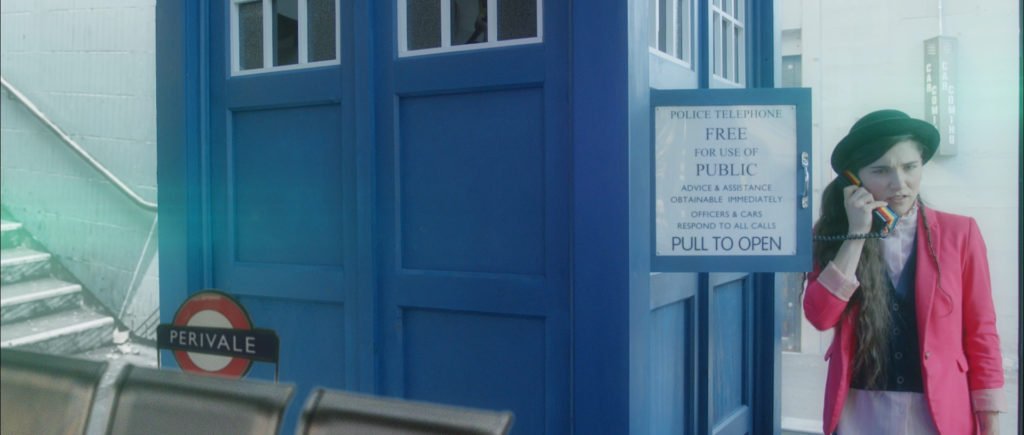
Still. They’ve made 4, and 2 of them had Daleks. Specifically, it’s Daleks that take over your life without you even realising: a secret invasion that calls to mind the likes of Army of Ghosts and The Power of Three. There’s a sinister corporation, an amnesiac companion, and several things blow up. It all looks very impressive, with gloomy spaceship hangars and metal monsters running amok, although “The hardest thing about that one was post-production, because it was all green screen. It’s rendering time: you set the shot up and it takes 3 hours to save.”
A multi-part narrative carries its own risks and problems, but for Chris – and Krystal, who wrote the Dalek episodes – one of the biggest challenges was maintaining the social commentary that’s part of the story’s ersatz without lapsing into preachiness (something that, it could be argued, Series 11 didn’t manage very well). The Velocity Daleks aren’t just lethal killing machines: they’re an analogy for a world where anger is instinctive and echo chambers are the new black. The Daleks built by hive (no capital), the tech company providing the backdrop to the Earth-bound elements of the story, are not creatures to be feared and loathed – they’re the next generation of Alexa, available at all good online retailers.
“We were coming off the back of the 2016 election,” Chris explains, “with Cambridge Analytica hacking everyone and people putting themselves into their own digital bubble where they’re the good guy and everyone else is the enemy. The Daleks are like the snowflakes of Doctor Who: they’re angered easily and scared easily and to a certain extent that’s why they attack. Everyone is literally retreating inside their own Dalek. In America we have the right to bear arms, so the metaphor was the computer world and home defence. We’re not that far off being Daleks, and Davros was our Steve Bannon.”
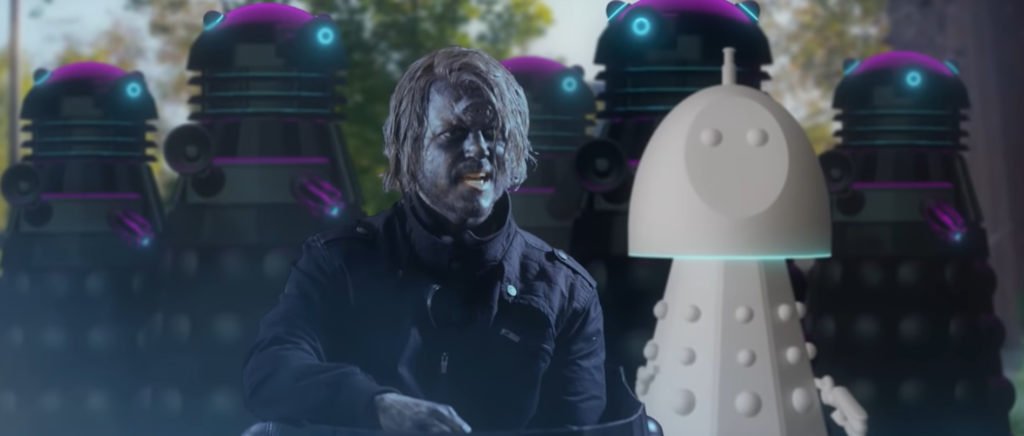
It’s a chilling vision of the future, if only because it seems so close to home, permeating both political discussion and sci-fi fandom. There is a difference between being right and doing right, which culminates in what Chris refers to as an “atmosphere of extremes – we’d rather shoot ourselves in the foot if it helps us stick to our principles”. Theoretically, television should be an escape from all this, but there is a rabid unpleasantness about fan discussions these days, and both Chris and Krystal have noticed.
“There’s something about being able to so easily and so filterlessly and so anonymously share your reactatory opinion about everything, all the time, to the entire world,” says Krystal. “It doesn’t harbour fruitful conversation or togetherness, or a friendly attitude: it’s tough. And if you grew up before the internet came to be and you knew how people interacted face-to-face before, it was different. It’s not that there weren’t issues – there are issues, always, but it’s a gasoline-on-the-fire situation.”
“We’ve got a split between the far left and the far right,” adds Chris, “and the way cyberspace hypes these arguments is to make them fight each other. The internet likes conflict; it likes clicks; it likes controversy because it generates revenue. And in the middle of it you’ve got the Doctor, who’s just trying to be nice to everyone. The new Doctor has seen the fads come and go so many times that the message was ‘Don’t throw out the baby with the bathwater’. There’s a tendency at the moment to want to smash everything up.”
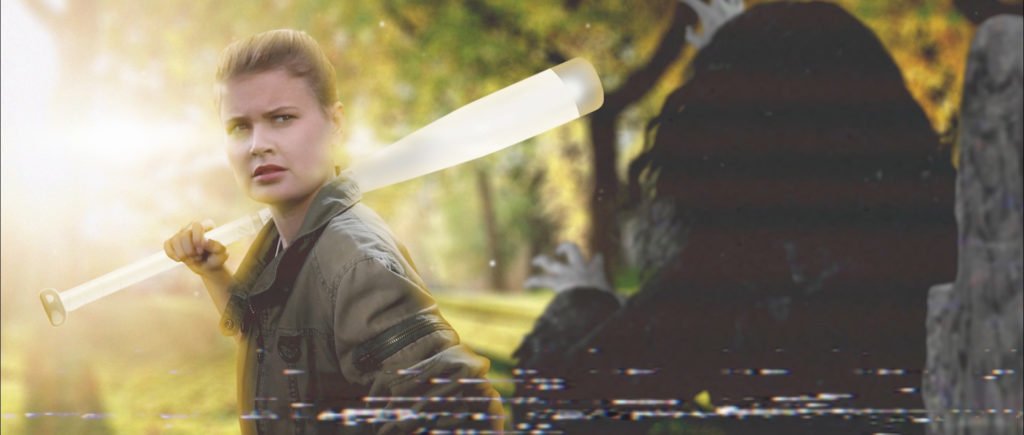
A self-proclaimed ‘black sheep’, Krystal grew up in a small town in Idaho before coming to Boise and getting into stand-up. She met Chris when she saw him helping an old man who’d fallen in the street (“You know he’s a keeper, right there”) and taking on the title role in Velocityhas been “a really interesting acting challenge. Because there’s so many different lives that the Doctor has lived, and so there’s certain things that in each episode I want to emotionally prepare for. So you have this wealth of material that you draw from.”
Among other things, Krystal performs stand-up comedy (“You get a thicker skin the longer you do it”), but curiously it’s her role as a parent that she draws on the most when it comes to playing the Doctor. “For me, it really rests on that unique maternal spirit. I’m a mother, and I’ve always taken care of kids, so I feel like I’ve been a mother for most of my life. And I think that comes through in a bold kind of way that works very well for the Doctor.”
I apparently look a little confused, because I’m about to get a practical demonstration. “I’ve got a good Mom Eye,” she explains, whereupon she removes her glasses and gives a hard stare, one eye thrust forward, penetrating, the brow arched, her lips subtly curved in the merest hint of a smile. It is disconcerting and mildly uncomfortable and I realise I’ve seen this before; it’s a look Krystal gives when she’s chewing someone out onscreen, although it’s quite different when you’re the one on the receiving end. “Basically, it means ‘I know I’m right, and you know what you did.'”
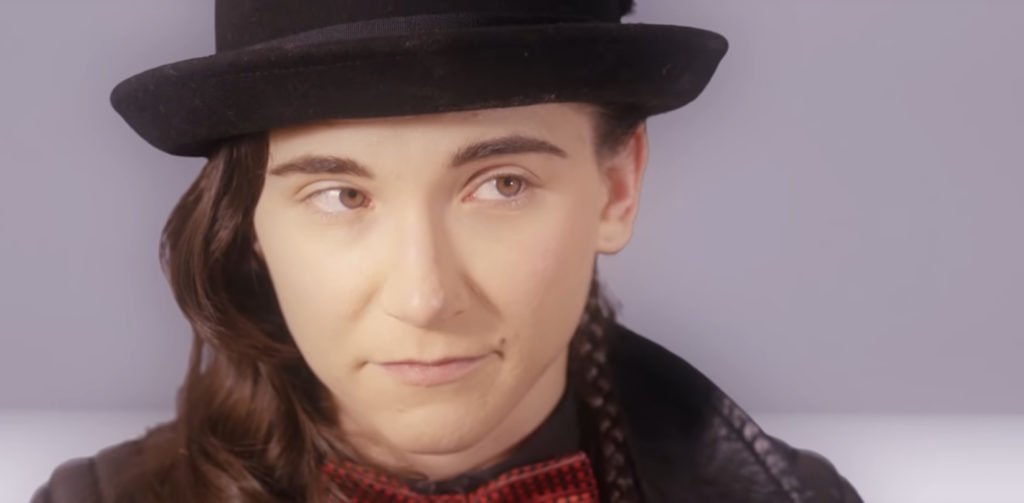
This is all fine and dandy, but what does she think about Jodie Whittaker?
“I’ve really enjoyed watching her. I think she’s handled this frankly nightmarish situation with grace and humour; she’s just a rock star and I admire her. Rosa was really well-written. Demons of the Punjab was a beautiful, phenomenal episode. When you can draw things out of history you can apply it to the now, so I love it when they do that.”
The bad stories, supposedly, made so little impression that she can’t remember them, but I press her a little and the Mom Eye is back, only this time it’s staring very hard at It Takes You Away. “I would have loved the frog at the end if the whole thing was a satire. It’s how you set the tone. When they’ve got a brooding, deep, sorrowful tone, and then there’s a frog, that’s classic comedy juxtaposition. That’s how it works: tension, and then pop the bubble. Graham’s dealing with the wife being dead, there’s a blind daughter, innocent mom, and then it’s like ‘These people just broke into this child’s house here! What’s going on?!?'”
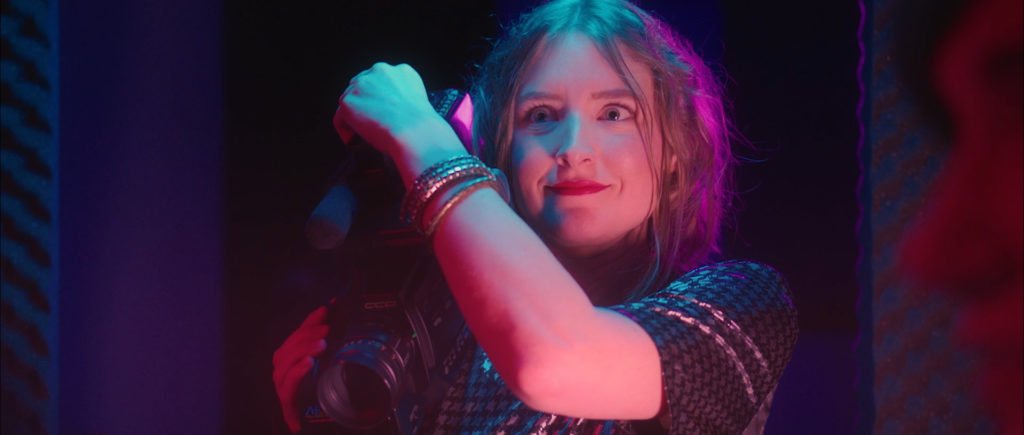
Did Whittaker’s casting help Velocity, or hinder it? “It was just one of those things that was on the zeitgeist. The BBC saw what we saw – there’s enough people who want to see a show where the Doctor is female. And I honestly didn’t think the BBC would quite yet; we thought they’d wait until the next one.”
Our time is at a close, and so I have to ask about what’s next for Velocity, but Krystal is tight-lipped when it comes to upcoming content: “Christmas” is about all I can get out of her. Instead I ask about Terrance Dicks – we’re speaking on the day his death is announced – and it’s Chris who points out the sheer longevity of Dicks’ association with the programme. “A lot of people work on Doctor Who very briefly and then get turfed out. To last that long, not only have you got to be good at what you do, you also have to be a master diplomat.”
And perhaps that’s it. Being good at what you do is only half the equation: treating relationships and life with more respect than the show you’re working on is the other half. In the last minute of our call, Krystal and Chris pull their children briefly into shot so they can say hello, and with that the family are off to enjoy what remains of their Labour Day. I somehow get the feeling they’ll do this while actively not thinking about Doctor Who. Perhaps I won’t either.

